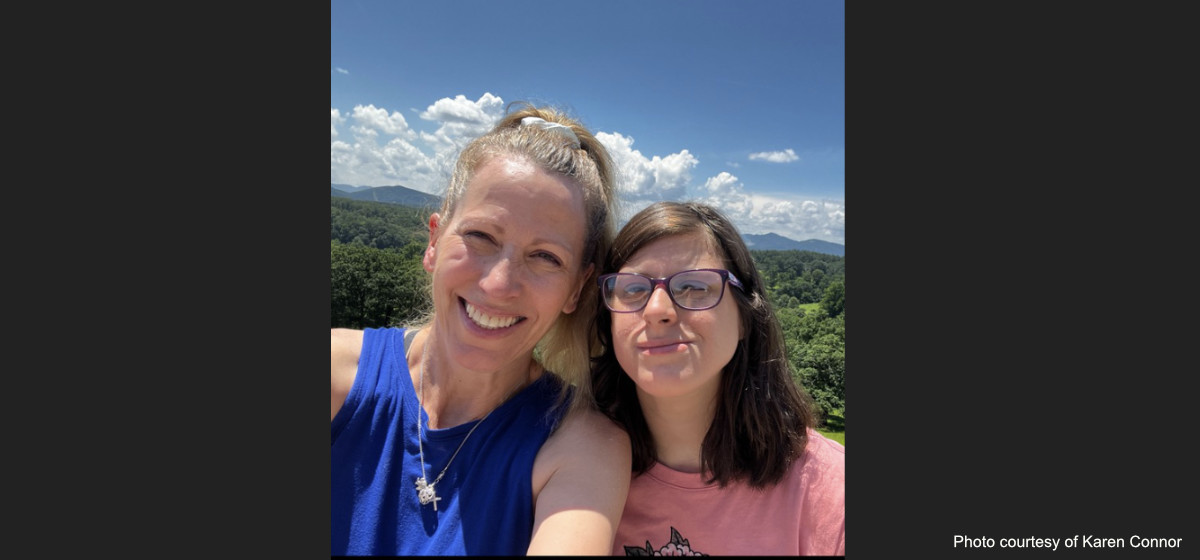Karen Connor had always been a pro-life advocate, even at 19 when she fought through the fear and uncertainty of an unplanned pregnancy.
Connor told Live Action News, “I wanted to have my baby realizing I’d have some struggles as a single mother. Abortion was never an option.”
But 18 years later Connor’s pro-life convictions would again be put to the test in a way she never expected.
Her oldest child, a daughter, was 16 when Connor’s second child was born. Another pregnancy soon followed, and Connor learned she was carrying twins. “By this time, I was 37 years old, so the doctors wanted to do genetic testing,” Connor said. “I agreed so I could be prepared in case there was an issue.”
An unexpected diagnosis
Connor underwent a chorionic villus sampling (CVS) test, typically done between 10 and 12 weeks, where a sample of tissue is taken from the placenta to determine chromosomal abnormalities or other genetic disorders.
When Connor received a call informing her the test indicated there was a problem, she was stunned.
Connor said, “I was completely broadsided. It was as if everything around me was going black. I never thought I’d get that call.”
She learned she was carrying fraternal twins, a boy, and a girl. The boy, she was told, was typical; the girl, however, had an extra chromosome 18.
“They thought it was Trisomy 18 which [they claimed] was not compatible with life,” Connor said. “They talked to me about being a high risk for miscarriage for both babies, including my son.”
Doctors recommended Connor get further testing but warned her if she didn’t abort her daughter, she could put her healthy son’s survival at risk as well.
Connor said, “I was devastated to be in this position. I had always been pro-life. But the doctors told me that it was in the best interest of my son to schedule an induction for my daughter. And I didn’t want to watch my baby die. I felt I had no other option, so I scheduled the appointment.”
However, concerned family and friends encouraged Connor to reconsider her decision.
“They were worried I’d regret aborting my daughter,” Connor said. “That if I went through with the abortion, it would haunt me throughout my life, wondering what my baby would have been like.”
READ: Unfathomable number of preborn children killed by abortion since Roe v. Wade
Trusting in God’s plan
It was possible, Connor realized, that even if she had the induction, she could lose both babies. Or it was possible that doctors could even abort the “wrong” baby. As these terrifying thoughts swirled in her head, Connor made the most affirming choice she could: she put her faith in God, trusting Him with the outcome.
Connor said, “My gut kept telling me I needed to trust in God’s plan. I chose not to ‘reduce’ my pregnancy as advised. I wasn’t going to make the decision which one of my babies was going to live or die. The doctors couldn’t believe I would make such a decision.”
When a doctor told Connor that he couldn’t guarantee she would carry her pregnancy to term but that he could guarantee her baby wouldn’t be normal, she responded, “Well, I can guarantee that you will no longer be my doctor.”
Connor sought out an obstetrician specializing in high-risk pregnancies and was forthright about her determination to carry both babies to term. “I made it clear I understood the risks involved and asked him if he could give both of my babies the same value, to which he agreed.”
As her due date approached, she grew excited to meet her daughter, delivering early at 34 weeks. Further testing determined her baby girl had Tetrasomy 18p, not Trisomy 18 as doctors previously believed. Doctors didn’t know much about the disorder but told Connor her daughter would be challenged with physical and mental disabilities.
Connor said, “She didn’t have the ability to nurse and was in the NICU for a while because she was below average weight, suffering from jaundice and needed some assistance with her breathing, but overall, she was relatively healthy. After the NICU, she went to a children’s home where they worked diligently with her.”
At home, Connor was balancing a packed schedule with three other children while working a job. She wanted to learn all she could about Tetrasomy 18p.
Connor said, “While doing research, I came across the Chromosome 18 registry where I was able to connect with other families who had children with the same genetic disorder. I wanted to know if she would have a shortened life span.”
As Connor saw pictures that families had posted of their now adult children with Tetrasomy 18p, she cried with relief knowing Shawna, too, could live well into adulthood. “Fear can be so strong, like a panic attack; you feel at times like running away,” Connor said. “Despite the initial shock and grief, I don’t regret having the genetic testing done; it gave me time to prepare myself.”
Fortunately, Connor has a great support system with other parents who have children with genetic disorders including Kurt Kondrich who inspired “Chloe’s Law” in Pennsylvania in honor of his daughter who has Down syndrome.
Connor said, “Shawna is very active; she participates in track and field in the Special Olympics and has lots of friends. She does have intellectual and physical disabilities but is advanced despite her condition.”
Shawna inspired her oldest sister to become a behavioral therapist who works with special needs children.
“There’s so much help available for parent-to-parent peer support groups where I’ve learned so much,” Connor said. “I cannot imagine life without Shawna. She’s joyful, funny, and loving. She is showered with much love from her siblings and those who know her. I’ve never regretted bringing her into the world.”







